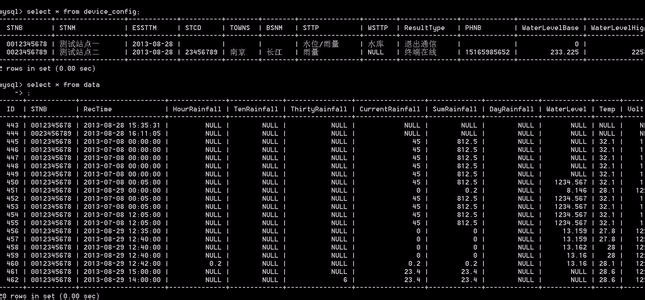
Using retention points, simple ROLLBACK and COMMIT statements can write or undo the entire transaction. However, this is only possible for simple transactions; more complex transactions may require partial commit or rollback. For example, the process of adding an order described earlier is a transaction. If an error occurs, just go back to before adding the orders row; there is no need to fall back to the customers table (if it exists). To support rolling back part of a transaction, it must be possible to place placeholders at appropriate locations within the transaction block. This way, if you need to roll back, you can fall back to a placeholder. These placeholders are called retention points. To create a placeholder, use the SAVEPOINT statement as follows: Enter: savepoint delete; Each savepoint is given a unique name that identifies it so that when it rolls back, MySQL knows where to roll back. In order to rollback to the retention points given in this example, you can proceed as follows: Enter: rollback to deletel; the more retention points, the better. You can set as many retention points as you want in the MySQL code, the more
1. 10 recommended articles about commit

Introduction: Simple ROLLBACK using retention points and COMMIT statement to write or undo the entire transaction. However, this is only possible for simple transactions; more complex transactions may require partial commit or rollback. For example, the process of adding an order described earlier is a transaction. If an error occurs, just go back to before adding the orders row; there is no need to fall back to the customers table (if it exists). To support rolling back part of a transaction, it must be possible to place placeholders at appropriate locations within the transaction block. In this way, such as...
2. Details about changing the default

Introduction: Use simple ROLLBACK and COMMIT statements to write or undo entire transactions using retention points. However, this is only possible for simple transactions; more complex transactions may require partial commit or rollback. For example, the process of adding an order described earlier is a transaction. If an error occurs, just go back to before adding the orders row; there is no need to fall back to the customers table (if it exists). To support rolling back part of a transaction, it must be possible to place placeholders at appropriate locations within the transaction block. In this way, such as...

Introduction: Using retention points, simple ROLLBACK and COMMIT statements can write or undo the entire transaction. However, this is only possible for simple transactions; more complex transactions may require partial commit or rollback. For example, the process of adding an order described earlier is a transaction. If an error occurs, just go back to before adding the orders row; there is no need to fall back to the customers table (if it exists). To support rolling back part of a transaction, placeholders must be placed at appropriate locations in the transaction block. This way, if you need to roll back, you can fall back to a placeholder.
4. MySQL transaction-ROLLBACK, detailed explanation of COMMIT usage

Introduction: Using ROLLBACK Now that we know what transaction processing is, let's discuss the issues involved in the management of transaction processing. The key to managing transaction processing is to break down groups of SQL statements into logical chunks and clearly define when data should and should not be rolled back. MySQL uses the following statement to identify the start of a transaction:
5. Detailed introduction to transaction processing in PDO

Introduction: A transaction is composed of a sequence of query and/or update statements. Use begin and start transaction to start a transaction, rollback to roll back the transaction, and commit to commit the transaction. After starting a transaction, there can be several SQL queries or update statements. After each SQL is submitted for execution, there should also be statements to determine whether it is executed correctly to determine whether to roll back in the next step. If all are executed correctly, the transaction is finally committed. Once a transaction is rolled back, the database remains in the state it was in before the transaction started. It is like if an edited file is exited without saving, the original appearance of the file will be retained. Therefore, a transaction can be regarded as an atomic operation, and the SQL within the transaction is either full
6. MySQL Transaction Processing Basics

#Introduction: What is a mysql transaction? Affairs generally refers to things to be done or done. In computer terms, it refers to a program execution unit (unit) that accesses and possibly updates various data items in a database. 2. Under what circumstances is it used? Things are generally used when operating multiple tables concurrently to ensure the integrity of user data ~ 3. How to use it? There are two main methods of transaction processing in MYSQL. 1. Use begin, rollback, and commit to implement begin to start a transaction roll
##7. PHP mysql transaction processing example

Introduction: Transactions must meet 4 conditions (ACID): atomicity (Autmic), consistency (Consistency) , Isolation (Isolation), Durability (Durability) Atomic (Autmic): The execution of a transaction must be "either don't do it, or do it all!", which means that part of the transaction is not allowed to be executed. Even if the transaction cannot be completed due to a failure, the impact on the database must be eliminated during rollback! Consistency: The transaction operation should make the database consistent...
8. PHP mysql transaction processing example

Introduction: Transactions must meet four conditions (ACID): atomicity (Autmic), consistency (Consistency), and isolation (Isolation) ), Durability (Durability) Atomic (Autmic): The execution of a transaction must be "either don't do it, or do it all!", which means that part of the transaction is not allowed to be executed. Even if the transaction cannot be completed due to a failure, the impact on the database must be eliminated during rollback! Consistency: The operation of the transaction should make the database consistent...
9. After starting the transaction in PHP, the program throws an exception and does not execute commit Will the mysql transaction be rolled back if rollback is not executed?
Introduction: Some people on the Internet say that after opening a transaction, the SQL statement execution error or the program error does not execute rollback, the next run will automatically commit, and the program error will not be rolled back. rollback, but some people say that if the program such as throwing an exception has an uncommitted transaction in MySQL, then AUTOCOM...
10. nginx - About phpmysql transactions
Introduction: Problem: I found that when the transaction does not commit or rollback, it will automatically rollback after the http request ends. Code example: {code...} But wait until this At the end of this request, this record in the database can be edited again. . . I want to ask whether it is nginx, fpm or phalco...
[Related Q&A recommendations]:
Mysql does not execute rollback when opening transactions The data will not be updated. Please ask!
Database concurrency and transaction issues, will find and insert operations insert data repeatedly?
java - Global transaction rollback but transactional code commit?
java - hibernate session is just a rollback transaction?
mysql source file, why does the transaction in it not work?
The above is the detailed content of 10 recommended articles about rollback. For more information, please follow other related articles on the PHP Chinese website!




